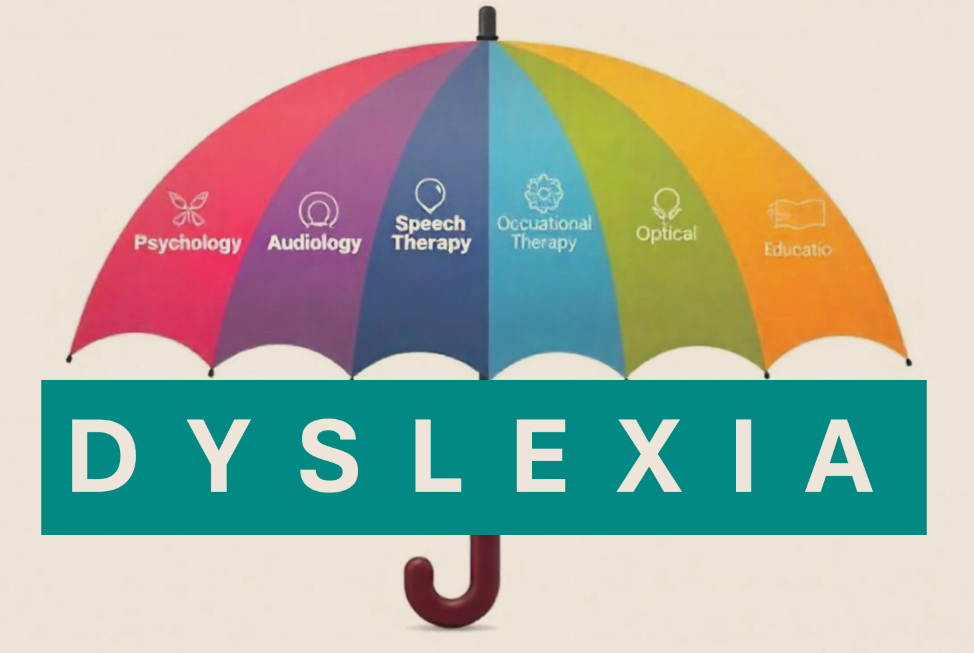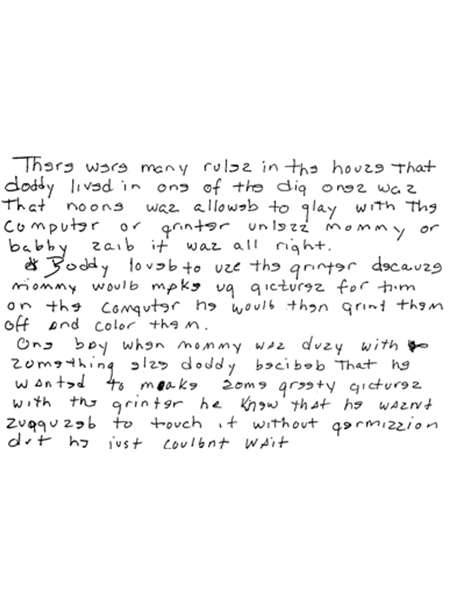UNDERSTANDING DYSLEXIA
What is Dyslexia
A Holistic Approach
Dyslexia can be a complex and often misunderstood learning difference. It is filled with confusion, partly because many different disciplines contribute to how we understand and support individuals with dyslexia. These include:
- Psychology
- Occupational Therapy
- Speech and Language Therapy
- Audiology
- Optometry
- Education

Each of these fields brings its own unique lens and insights. For example, the medical field typically uses the DSM-V (Diagnostic and Statistical Manual for Mental Disorders) to classify dyslexia under the umbrella of “Specific Learning Disorder”—sometimes viewed as a type of mental disorder.
In contrast, within the educational field, dyslexia is often seen as a different way of learning—a different ability, rather than a disability. With the right support and strategies, individuals with dyslexia can thrive both academically and personally. In countries like the USA and UK, dyslexia is firmly recognized within the educational field, and educators are qualified to identify and diagnose it.
South Africa is in the process of developing its approach to dyslexia identification within the educational sector, with growing awareness and efforts toward better support in schools. Dyslexia is frequently missed or misunderstood because only a limited set of signs may be recognized within a specific professional field. That’s why it is essential to take a holistic approach, considering the full range of indicators and perspectives to ensure accurate identification and effective support.
Consultation Overview: Understanding Dyslexia
What is Dyslexia?
Definition: Dyslexia is a specific learning difficulty that affects reading and language processing. It is characterized by difficulties with accurate and/or fluent word recognition and by poor spelling and decoding abilities.
Not a Reflection of Intelligence: Dyslexia is not indicative of a person’s overall intelligence. Many individuals with dyslexia are highly intelligent and creative thinkers.
While my practice is based in Cape Town, I offer convenient online consultations.
What Happens in the Brain?
- Neurobiological Basis: Dyslexia is linked to differences in how the brain processes written and spoken language. Studies show that areas of the brain responsible for language processing may function differently in individuals with dyslexia.
- Phonological Processing: One key area affected is phonological processing, which involves recognizing and manipulating sounds in language. This can impact reading fluency, spelling, and writing.
- Brain Imaging Studies: Research using MRI and other imaging techniques has demonstrated that individuals with dyslexia often show differences in brain activation patterns compared to those without dyslexia, particularly in regions associated with reading.
How Dyslexia Affects the Individual
Reading Challenges
Dyslexia can have a wide-ranging impact on an individual’s reading, writing, and overall learning experience. One of the most common challenges is difficulty with reading. Individuals may struggle to decode words, recognize familiar sight words, and read fluently. This can cause frustration, slow down the learning process, and significantly reduce confidence over time.
Writing and Spelling Difficulties
Writing and spelling also tend to present challenges. Many individuals with dyslexia find it difficult to organize their thoughts clearly in writing and often demonstrate inconsistent spelling, even with words they use frequently. These struggles can make written assignments particularly stressful and time-consuming.
Impact on Learning
The cumulative effect of these difficulties often impacts broader areas of learning. Academic performance may suffer, which can lead to a decline in self-esteem and motivation. Over time, individuals with dyslexia may develop anxiety related to schoolwork and learning environments, making it even harder for them to reach their full potential without appropriate support and intervention.
Supporting Dyslexia Going Forward
- Create a Supportive Environment:
- Encourage a positive attitude toward reading and learning. Focus on strengths and interests to build confidence.
- Use Specialized Teaching Strategies:
- Implement multi-sensory approaches that engage visual, auditory, and kinaesthetic learning styles.
- Utilize Assistive Technology:
- Introduce tools such as text-to-speech software, audiobooks, and apps designed to support reading and writing.
- Foster Open Communication:
- Maintain ongoing dialogue with teachers and support staff to ensure consistent strategies are used both at home and in school.
- Encourage Reading at Home:
- Read together regularly, choosing books that match the child’s interests and reading level. Make reading enjoyable and interactive.
- Seek Support Groups:
- Encourage participation in local or online support groups where families can share experiences, resources, and strategies
- Professional Intervention:
-
- Consider working with specialists, such as educational therapists or tutors trained in dyslexia, to provide tailored support.
-
You’re Not Alone. Let’s Take the First Step Together.
Dyslexia is a manageable condition, and with the right understanding and support, individuals can thrive academically and personally. By working together, we can help your child navigate their learning journey with confidence and success.
Common Misconceptions About Dyslexia
Dyslexia is just a reading problem
While dyslexia primarily affects reading, it can also impact writing, spelling, and sometimes even math. It involves difficulties with language processing rather than merely reading words.
Dyslexia is a sign of low intelligence
Dyslexia is not related to a person’s intelligence. Many individuals with dyslexia are highly intelligent and creative. They may excel in areas such as problem-solving, critical thinking, and the arts.
Dyslexia only affects children
Dyslexia is a neurobiological condition and affects all ages. Many adults (with undiagnosed) dyslexia have learned to manage their challenges, but they may still experience difficulties with reading and writing.
People with dyslexia see letters and words backwards
While some individuals may confuse certain letters or words, dyslexia is not about visual perception; it is primarily a language processing issue. It involves difficulties with phonemic awareness, decoding, and fluency.
Dyslexia can be outgrown
Dyslexia is a lifelong condition. While individuals can learn strategies to cope and succeed academically, the underlying challenges typically remain. Early intervention can greatly improve outcomes
All individuals with dyslexia read slowly
Reading speed varies among individuals with dyslexia. Some may read slowly, while others may develop strategies that allow them to read more quickly, albeit with ongoing challenges in comprehension.
Dyslexia is caused by poor teaching or lack of effort
Dyslexia is a neurobiological condition and is not caused by a lack of instruction or motivation. Effective teaching strategies can help to support the dyslexia.
Only children with obvious difficulties are dyslexic
Dyslexia can present in various ways, and some individuals may mask their difficulties through compensatory strategies. It is important to assess not only those who struggle visibly but also those who may have subtler signs.
There is only one type of dyslexia
Dyslexia is not a one-size-fits-all condition. There are different types and degrees of dyslexia, and each individual may experience a unique set of challenges and strengths
Once diagnosed, nothing can be done to help
While dyslexia is a lifelong condition, there are many effective interventions and support strategies available. With the right resources, individuals can develop strong reading and writing skills.
Positive Impact!
“We would like to commend you on the positive environment you create for the kids you work with, as well as for the parents. You have created a safe space for Dylan and your constant enlightenment and encouragement has helped him navigate through some difficult paths.
Your expertise in dyslexia and your knowledge on autism and sensory processing difficulties is top class. You have been very effective in providing both Dylan, and us as his parents, with practical management plans and tools to assist us in navigating this new journey.
Your kindness, and support has had a very positive impact on Dylan, and we will always be grateful for your input.
Many thanks for everything.”
Lisa Davey
Let’s Talk over a Cup of Coffee

